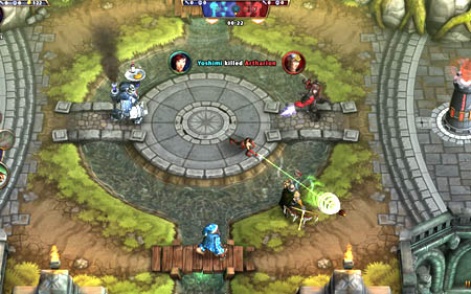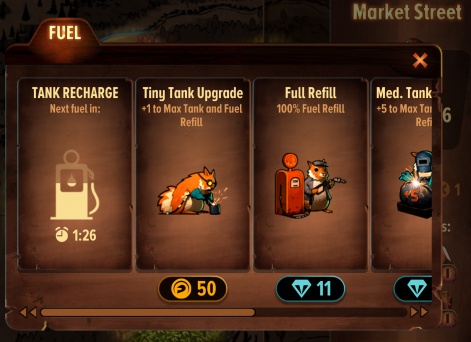We've now been running our Mobile Mavens panel for a number of years.
It's a group of industry experts who discuss the hot topics of the mobile games industry on a weekly basis.
But how about going really deep into one of the key and ongoing subjects faced by all free-to-play game designers and operators - monetisation?
It is about the money
So, with that thought in mind, I've added another string to our regular Monetizer column, with the formation of the Monetizer Mavens.
We'll be regularly discussing the trends occuring at the interaction of delighting players and generating cash.
And we're also looking for new members, so if you'd like to be considered, please drop jon [at] pocketgamer.co [dot] uk an email explaining your credentials.
This week, our question concerned the controversial monetisation technique of energy. We asked:
Is there any place in the F2P designer's toolbox for energy-based economies now?
What are the alternatives in terms of slowing down progress?
And finally, should we even be trying to slow down progress. Surely there are more innovative ways to interact with our audience?

Ben is a 15-year veteran of the games industry - he's worked as a senior executive, studio head, project lead, creative director and game designer at companies like DeNA, EA, Sony and Lionhead.
He started working on traditional games, but has been focussed on the free-to-play business model since 2006 - an extremely long time by western standards. During that time He's worked on a total of ten separate free-to-play games across five different platforms reaching over 50 million users.
Looking at the top grossing chart, can we really be certain that energy (or lives) based economies have failed?
Also, what wrong with slowing down progress? There's very few traditional games where the game doesn't get more difficult (and progress slower) as you continue to play. All a mobile game will do is balance that progression based around 5-10 three minute sessions a day rather than the traditional game's single four hour session a week.

A mobile game designers' toolbox is just that, a collection of tactics and mechanics to be used for the appropriate platform, genre and player type.
Energy-based gating systems have their place, but too many games I look at apply a Candy Crush-inspired lives system as their gating mechanic when their game does not properly support it. Or they have a CSR-styled fuel system, applying it without thinking beyond "if it worked for them it will work for us."
If the player has full access to all game systems, then what is it they will pay for?Ethan Levy
For some games an energy system or lives system will work, for others it will not, and it is up to the development team to choose the right gating mechanic for their game, or innovate on gating mechanics if their game demands it.
In general, a F2P game will require some form of gating mechanic. If the player has full access to all game systems, then what is it they will pay for?
The challenge is to find the appropriate gating mechanic (of blend of gating mechanics) for your game, platform and audience. For instance, MOBAs Heroes of Order and Chaos and Solstice: Battle Arena have both adopted the rotating hero mechanic from League of Legends. Heroes is a fairly faithful LoL adaptation whereas Solstice made more changes to the design to make it a more short session-friendly MOBA.
Judging by the top grossing chart positions of both games, neither have set the world on fire the way their developers likely hoped when they decided to tackle the MOBA genre. These are both instances, in my opinion, of not adopting the appropriate gating tool for the platform and play-style it cultivates. Their are many different game mechanics these two MOBAs could have chosen to gate player progress and create an avenue for monetization.

Should we even be trying to slow down player progress? Sometimes yes, sometimes no.
If a designer would prefer a game that has no gates on player progress, then it is likely they should be creating a premium priced game with no (or minimal) in-app purchases. If they wish to make a F2P game, then by nature they will be preventing the player from getting something without paying.
More lives, more fuel, more cards, more heroes, more evolutions, more quests: there has to be a more something for the player to pay for if they are accessing the game for free.

Card battlers and match-3 titles are mainstay on the top grossing lists. Thus it's safe to say that energy-based systems are still alive and kicking. What has changed is that there are far less categories that use energy based economies anymore. For example simulation games are now all timer based when back in Facebook we used to click through energy bars in games like CityVille and Sims Social.
There are no alternatives for slowing down players' progress because this is the cornerstone for making games social. First of all, progress is relative to the game. If I invest hundreds of hours of gameplay into a game I need it to show somehow to my peers.
In EA Sports games it's my skills and league ranking. In farming games it's the size of my farm and in match3 games it's the level I'm on.
Secondly, If players progress isn't slowed down the ability to compare progress dies off and with it all the social gameplay. Just think about level based games like Candy Crush Saga. Players can go through first 100 levels in a month. The next 100 levels will require 3 months and the following 5 months.
By slowing down progress we can keep players relatively close to each other. Just enough to create the desire for those who are lagging behind to catch up. We don't want the scenario where new players come in to the game, feel that they are so far behind that they'll never be able to catch up and quit playing.
Energy systems are misunderstood. F2P naysayers think they are cynical ploys to extract money.
I think they are better thought of as retention mechanics.Nicholas Lovell
I think they are better thought of as retention mechanics. They help break the game down into manageable chunks and give players permission to leave the game.
It may seem strange to use the word "permission" but many F2P games are aimed at people who can trebly spare the time for huge sessions. So energy helps to give them reasons to leave, and reasons to come back.
Elegant energy mechanics, such as those in Another Case Solved, fit the fiction, allow players to play reasonably long sessions, but also create tendon and the desire to return to the game.
So I would say that clunky Zynga-style energy mechanics are on their way out, and good riddance. But more subtle seasoning techniques remain a crucial part of the game designers toolbox.

Echoing what has previously been said; there is definitely a place for energy-based economies. The issue is that often times the F2P mobile game designers’ toolbox, consisting of both the gameplay and the business plan, have huge partition between the two, creating this uncanny valley of F2P mobile games.
I cannot emphasize enough, the importance of creating that synergy between gameplay and business, from the very get go. We see a whole bundle of games, often times with huge IPs, belly flop on the App Store/Google Play because they didn’t do so.
It would be very interesting to see alternatives to the popular gating mechanics - I’m all for new ways to monetize. But it just seems as, revenue-vise, the gating mechanics are too effective in mobile games, to even consider anything but it. I think it’ll be some time, before we see a top grossing game with a non-gating mechanic.
Finally, as Ben says, why shouldn’t F2P mobile games slow down progression?
Everyone need a sense of progression and with the casual player be the primary target audience, chopping up the play sessions quite fit the bill.
In my experience with midcore games, the energy refill as direct monetization tool is pretty irrelevant as a share of overall hard currency spending.
Energy refill as direct monetization tool is pretty irrelevant as a share of overall hard currency spending.Justin Stolzenberg
But in addition to the retention-boosting effect of energy systems, they also level the playing field and allow more players to have the feeling that they can actually compete – when most people in my league are limited in playtime, it’s okay to be only able to play a few minutes at a time during work hours.
I see two crucial factors:
- Energy has to fit the fiction as a resource – food for troops that you can farm makes sense to players, a virtual “energy” bar doesn’t.
- The game has to offer enough to do without paying for an energy-refill even for the occasional 60 minute session – this could be other play modes. When a game does both of these right, energy feels natural.
Personally, in the context of gating, the popular waiting times are a much bigger pain point (for which I don’t have a great solution ;-)). Waiting a day for an upgrade that unlocks clicking a button to wait another 12 hours to unlock the actually cool stuff – not so great.

Energy/soft currency and time are great restriction mechanics for casual social games because players' progress is gated by the amount of time they invest into the game instead of their skills as a gamer.
Bear in mind that we're making games for the mass market. Players, most of whom don't own consoles or have ever played Diablo, Civilization or Command & Conquer.
Now if I were to make a F2P game for gamers I'd naturally gate the progress with skill factors. LoL, DotA and Hearthstone are great examples of skill-based progress gating. These games have also quite high of a entry barrier as they are designed for experienced audience.
(Hearthstone is actually very accessible but gets quite complicated after a week of gameplay).

With over 15 years’ data mining experience, Mark co-founded deltaDNA, formerly GamesAnalytics, to unlock big data to drive player understanding, introducing the concept of Player Relationship Management to build better games.
A little contribution from me….
The energy mechanic is not the most loved business model but there is no sign of it dropping out of the designers toolbox anytime soon.
For example: Trials Frontier by RedLynx/Ubisoft hit the App Store in April 2014 and soon reached number one in 75 countries. Trials Frontier uses an energy mechanic (fuel) much like CSR Racing.
As players level-up they gain a complete re-fuel that extends the gameplay session and encourages players to continue. The game also offers unlimited retries within a particular level without the consumption of fuel so players looking for that perfect run could play for as long as they please until they nail it.

Carefully balancing energy-based mechanics will be difficult to manage for any designer and will always work best when built into the game concept/story rather than being tacked on.
In our opinion, any mechanic that stops the player progressing will cause defection, so it is very important that players have alternative routes/objectives so they never feel they have to leave the game at any given time.

Ben is a 15-year veteran of the games industry - he's worked as a senior executive, studio head, project lead, creative director and game designer at companies like DeNA, EA, Sony and Lionhead.
He started working on traditional games, but has been focussed on the free-to-play business model since 2006 - an extremely long time by western standards. During that time He's worked on a total of ten separate free-to-play games across five different platforms reaching over 50 million users.
Energy mechanics are generally fabulously sensitive to tuning.Ben Cousins
This is the theoretical purpose of an energy mechanic.
It is rather typical of F2P mechanics in that it has a friction component and a monetization component. It is also rather typical in that energy mechanics are generally fabulously sensitive to tuning.
The best way to determine if an energy mechanic is right for your game, and what the correct associated variables are is to implement and do a test to see which setups and values give you the best LTV.
By looking specifically at LTV you make sure you are not testing either retention or conversion in detail and move towards the optimum possible outcome.

Ben, What do you mean by testing energy mechanic to determine optimal LTV?
If you decide to go with energy mechanic that locks your core loop and majority of features along the way. Testing whether to use an energy mechanic or not is thus not something you can do with an A/B test - at least not with a majority of games.
What you can test are tuning values to energy mechanic itself such as regeneration time, price and size of the energy bar etc.
This helps to determine which setup values are optimal, but it doesn't help to determine not whether to use energy mechanic or not. That is a decision that the team needs to make in concepting or pre-production.

Ben is a 15-year veteran of the games industry - he's worked as a senior executive, studio head, project lead, creative director and game designer at companies like DeNA, EA, Sony and Lionhead.
He started working on traditional games, but has been focussed on the free-to-play business model since 2006 - an extremely long time by western standards. During that time He's worked on a total of ten separate free-to-play games across five different platforms reaching over 50 million users.
Consumers don't notice currencies until they run out. You can test your game with no energy system pretty effectively by simply never having the resource run out (zero action cost, very fast drip rate, zero random energy drops).
If you are testing an energy system I would also suggest you try a variant where it simply has zero impact on the game. You may find the best LTV is actually down this path.























